


This article offers essential tips for individuals living with atrial fibrillation (AFib) to help them manage their heart health effectively. It highlights the significance of a holistic approach, one that embraces personalized care, a heart-healthy diet, regular exercise, stress management, and ongoing education. These elements are crucial, as they contribute to better outcomes and enhance the quality of life for patients.
In addition to this, understanding that managing AFib can be daunting is important. Many individuals may feel overwhelmed or anxious about their health. However, by taking small, manageable steps, they can make a positive impact on their well-being. Remember, you are not alone in this journey; support is available to guide you through each stage.
Furthermore, embracing these strategies not only empowers you but also fosters a sense of control over your health. Each choice you make, whether it’s adopting a nutritious diet or engaging in regular physical activity, plays a vital role in your heart health.
Ultimately, the goal is to cultivate a supportive environment where patients feel valued and understood. By prioritizing heart health through these compassionate approaches, you can look forward to a healthier and more fulfilling life.
Living with atrial fibrillation (AFib) can indeed present a unique set of challenges that may feel overwhelming. Yet, understanding how to manage this condition effectively can lead to a healthier and more fulfilling life. This article explores ten essential tips that empower individuals with AFib to take control of their heart health through lifestyle changes, dietary adjustments, and the importance of a support network.
Have you ever wondered what the most effective strategies are to not only cope with AFib but also thrive in spite of it?
At Amavita Heart and Vascular Health, we understand that living with afib can be a daunting journey. That’s why we adopt a holistic approach, creating tailored care plans that meet the unique needs of each patient. Under the compassionate leadership of Dr. Pedro Martinez-Clark, we prioritize a thorough understanding of individual health profiles. This understanding is crucial for effective AFib management.
We utilize cutting-edge diagnostic tools, including innovative AI-powered point-of-care ultrasound technology developed in collaboration with AISAP. This technology enhances early cardiac diagnostics, particularly for individuals in underserved communities, ensuring that essential care is accessible to all.
Our dedicated team offers empathetic support to individuals living with afib, empowering them to confidently navigate their heart condition. This patient-centered approach not only enhances the quality of care but also significantly improves treatment outcomes. As Dr. Martinez-Clark emphasizes, "Personalized care is crucial for effectively managing atrial fibrillation, as each patient's requirements and reactions to care can differ significantly."
With our commitment to individualized support, innovative therapies, and same-day ease, Amavita stands out as a top choice for anyone living with afib who seeks expert management. We invite you to reach out and discover how we can support you on your journey to better heart health.
Living with afib can feel overwhelming, but managing atrial fibrillation with a heart-healthy diet can significantly help. It’s important to focus on incorporating a variety of fruits, vegetables, whole grains, and lean proteins into your meals. Foods rich in omega-3 fatty acids, such as salmon, walnuts, and flaxseeds, can be particularly beneficial for your heart health. Diets abundant in omega-3 polyunsaturated fats are linked to a lower risk of atrial fibrillation. On the other hand, it's wise to limit or avoid:
High alcohol intake can increase the risk of developing atrial fibrillation and trigger episodes, which can worsen your symptoms.
The Mediterranean diet is a wonderful choice for those living with afib. This diet emphasizes:
All of which can greatly improve your cardiovascular health and reduce the frequency of atrial fibrillation symptoms. Additionally, staying well-hydrated is crucial, as dehydration can lead to episodes of atrial fibrillation. By embracing these dietary strategies, you can take meaningful steps toward better heart health and an improved quality of life while living with afib. Remember, you are not alone in this journey, and there are resources available to support you every step of the way.

Engaging in regular physical activity is vital for managing arrhythmia symptoms and improving overall heart health. Patients are encouraged to strive for at least 150 minutes of moderate-intensity aerobic activity each week, such as brisk walking or cycling. It’s important for individuals living with afib to consult their cardiologist before starting or changing any exercise routine to ensure it is safe and appropriate for their condition.
At Amavita Heart and Vascular Health®, we focus on a preventive cardiology approach that combines advanced risk evaluation tools with personalized interventions. This helps identify risk factors and develop strategies to reduce heart attack risks, which is particularly significant for patients with atrial fibrillation. Additionally, incorporating flexibility and strength training exercises can improve overall fitness and decrease the likelihood of falls, especially among older adults.
Cardiologists emphasize that living with afib can be positively affected by maintaining consistent physical activity, which can significantly reduce both the frequency and severity of atrial fibrillation episodes. This makes it a crucial component of effective heart health management. Remember to warm up and cool down properly before and after your workouts; this practice is essential for managing symptoms and ensuring a safe exercise experience.
It’s also vital for patients to recognize warning signs that indicate they should stop exercising, such as chest pain or dizziness. If you experience any of these symptoms, please seek medical attention. Your health and safety are our top priorities, and we are here to support you every step of the way.
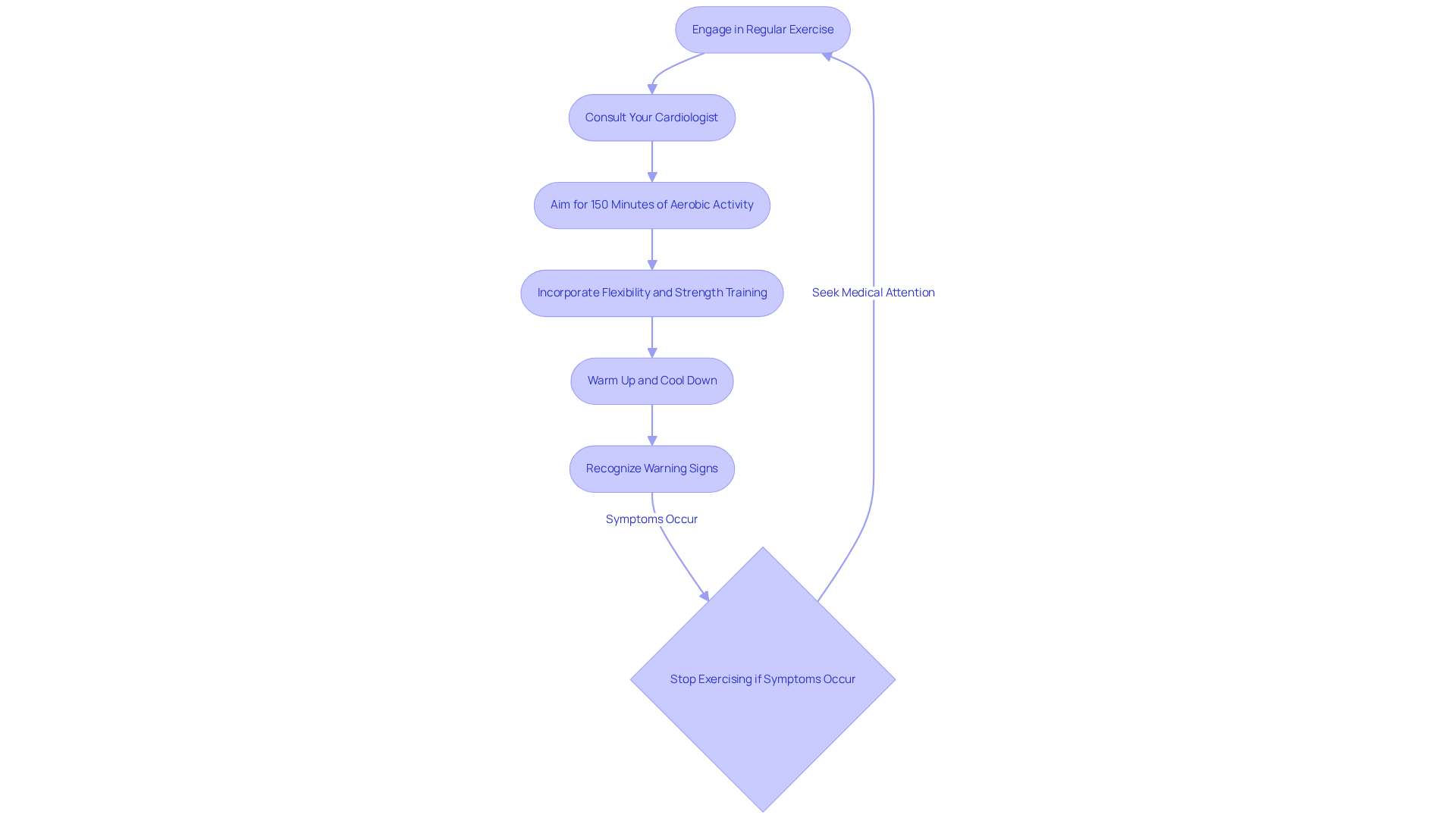
Following a recommended care plan is essential for effectively managing the challenges of living with afib. Are you taking your medications as directed? It’s important to prioritize regular follow-up appointments with your healthcare providers. Open dialogue about any side effects or concerns is vital; this allows for timely adjustments to your treatment plan. Proactive conversations about your symptoms and potential lifestyle modifications can significantly enhance your healthcare provider's ability to tailor their approach specifically for patients living with afib.
Statistics show that effective communication between patients and doctors can lead to improved outcomes. For example, a recent study revealed that the percentage of individuals prescribed blood thinners at discharge increased to over 95 percent. Healthcare experts emphasize that cultivating a cooperative relationship is crucial to ensuring you feel supported and informed throughout your treatment journey. As Bradley Knight, MD, states, "These data confirm that high-level adherence to guideline-recommended stroke prevention is achievable."
Furthermore, our CardioElite™ program enhances cardiac care by providing real-time diagnostic data and 24/7 cardiology consultation. This can significantly reduce readmissions and improve your overall management. Remember, you are not alone in this journey; we are here to support you every step of the way.

Effectively managing stress is essential for individuals living with afib. Have you ever noticed how psychological stress can trigger and worsen atrial fibrillation symptoms? This makes it crucial to implement strategies that encourage relaxation and emotional health. Techniques such as:
can significantly reduce anxiety and enhance relaxation. Regular physical activity not only serves as a natural stress reliever but also contributes positively to heart health.
It's important for patients to take the time to identify their personal stress triggers and develop tailored coping strategies. Engaging in enjoyable hobbies, spending quality time with loved ones, and seeking professional support when necessary can further bolster emotional resilience. Remember, social support is particularly important; it can provide comfort and reduce feelings of isolation.
Furthermore, it's essential to be cautious about self-treating with alcohol or herbal supplements, as these can provoke atrial fibrillation symptoms or affect medications. Integrating these practices into everyday habits can lead to significant enhancements in overall well-being and help reduce the effects of stress while living with afib. Acknowledging stress as a potentially changeable risk factor is vital for a more comprehensive strategy for managing atrial fibrillation, particularly for those living with afib, ultimately enhancing your quality of life. Additionally, initiatives such as the SMART Program offer beneficial psychoeducational interventions that teach mind-body skills and coping strategies, improving stress management for individuals with heart conditions.

For individuals living with afib, consistent monitoring of vital health metrics is essential. Key indicators, such as heart rate, blood pressure, and weight, should be tracked regularly. Keeping a comprehensive diary of symptoms and AFib occurrences can help both individuals and their healthcare providers recognize patterns and potential triggers, leading to more personalized care.
Wearable devices designed for heart rhythm monitoring offer significant benefits. They provide real-time information that can enhance user engagement and enable timely interventions. As Dr. Perel observes, these instruments empower patients to actively track their cardiac condition, fostering a sense of safety and control in their health journey.
Regular consultations and diagnostic tests, including echocardiograms, remain vital for assessing heart condition and refining treatment strategies. The integration of wearable technology into daily management not only aids in effectively monitoring symptoms of living with afib but also enhances overall well-being. Remember, you are not alone in this journey; support is always available to help you navigate your health with confidence.

Understanding living with afib is essential for effectively managing your health and achieving better health outcomes. Have you taken the time to learn about the causes, symptoms, and potential complications of atrial fibrillation? By actively educating yourself about living with afib, you can empower your journey toward wellness. Utilizing trustworthy resources—such as educational materials from healthcare providers, support groups, and reliable websites—can greatly enhance your knowledge. Being informed about available care options and necessary lifestyle changes is crucial for those living with afib, as it allows you to take an active role in your well-being.
This proactive approach not only helps improve your health but also clarifies common misconceptions about living with afib, such as the belief that it is easily treatable. As Dr. Litsa Lambrakos emphasizes, recognizing the symptoms of living with afib early is crucial for timely diagnosis and treatment. This highlights the importance of ongoing education for individuals living with afib.
By understanding your condition while living with afib, you can engage in meaningful conversations with your healthcare professionals. This collaboration can lead to personalized management strategies for those living with afib that align with your unique health needs. Remember, living with afib means you are not alone on this journey; support is available, and taking these steps can significantly impact your health and well-being.
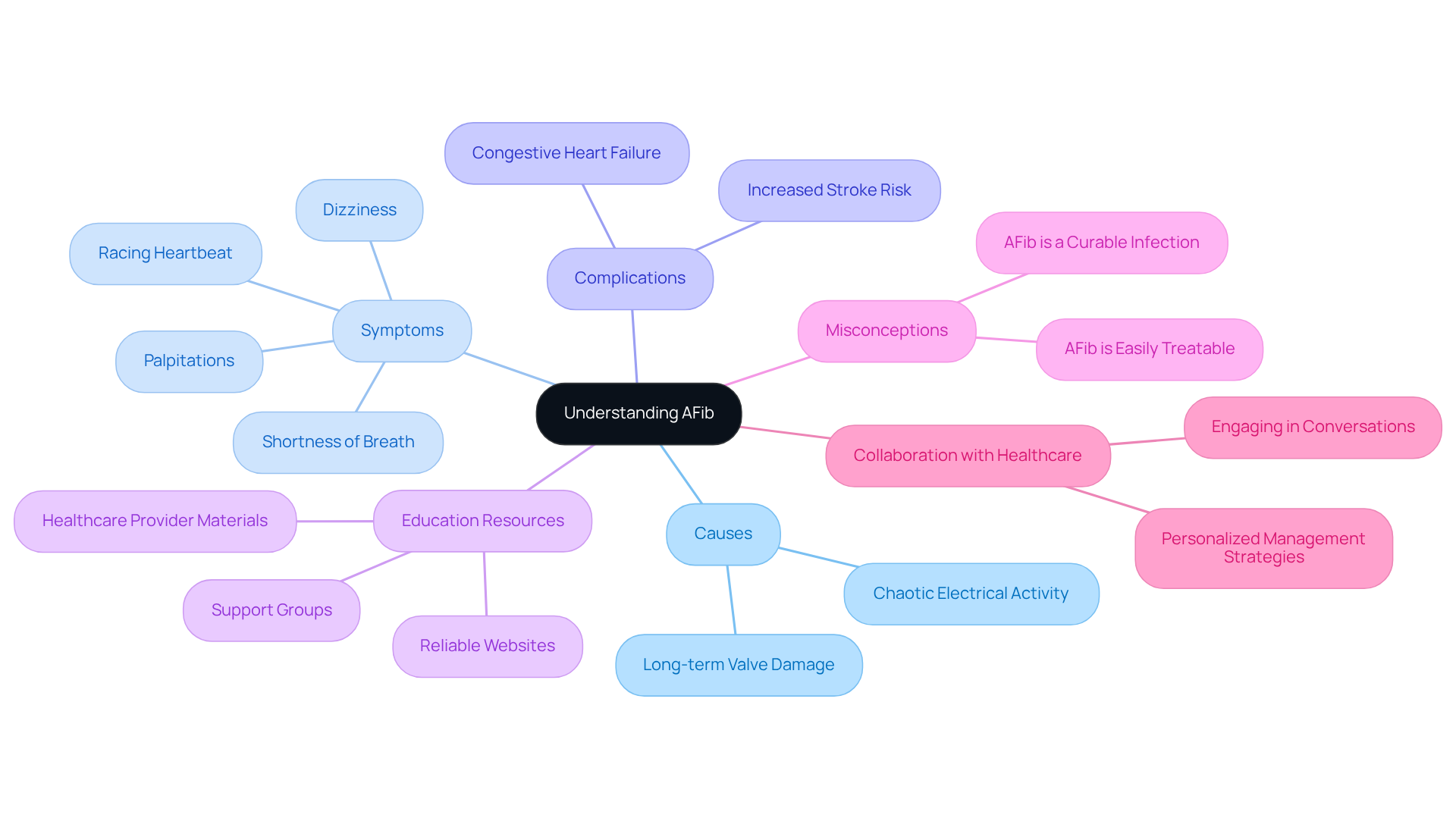
Creating a strong support network is essential for individuals living with afib. Involving family and friends not only provides emotional backing but also practical assistance in managing the condition. Have you considered how open communication regarding AFib can enhance your journey? Sharing your experiences and care strategies with loved ones promotes a collaborative approach to health management. Engaging family members in discussions about lifestyle changes can lead to better adherence to treatment and healthier habits.
For instance, studies show that patients who lose weight and stay active have fewer atrial fibrillation episodes. This highlights the importance of family support in encouraging these positive changes. Additionally, support groups—whether in-person or online—serve as valuable resources, connecting individuals with others facing similar challenges. This sense of community can significantly alleviate feelings of isolation, making the journey toward improved cardiovascular well-being while living with afib more manageable and empowering.
Moreover, using digital health tools can improve communication and symptom monitoring, enabling families to be more engaged in the management of atrial fibrillation. Continuous education and support are vital, as emphasized by healthcare professionals. This ensures that you and your family are well-informed and engaged in the treatment process. Remember, you are not alone on this journey; support is available, and together, we can navigate the path to better health.
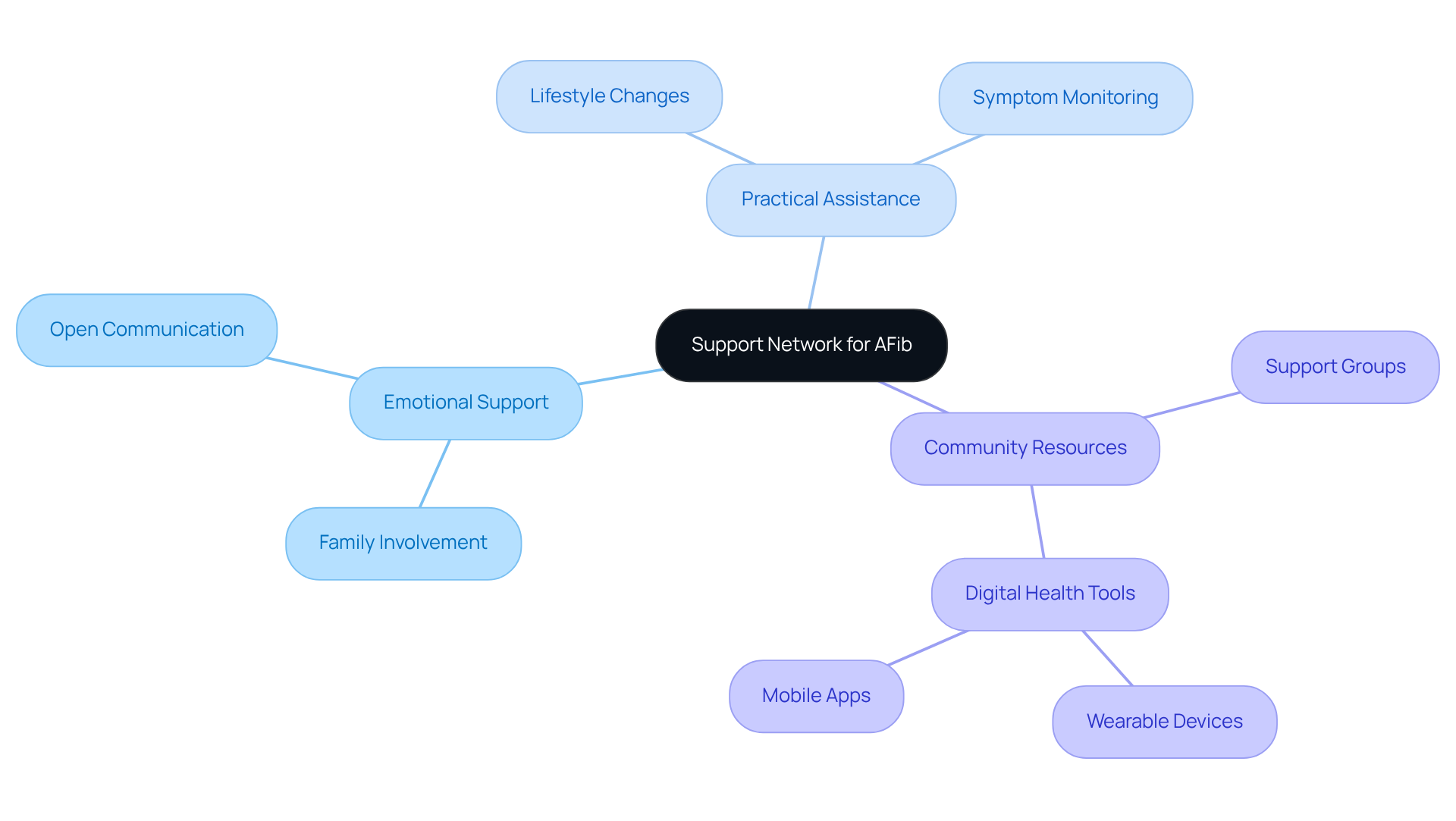
For individuals living with afib, it is essential to prioritize mental well-being. Have you ever felt that anxiety can significantly affect your heart condition? It can potentially worsen AFib symptoms. Effective coping strategies, such as cognitive-behavioral therapy (CBT), can help you recognize and challenge negative thought patterns, leading to improved coping skills. Mindfulness practices, including relaxation techniques like deep abdominal breathing, are scientifically shown to decrease cortisol levels and enhance mood, making them helpful for alleviating anxiety and improving overall emotional well-being.
Ensuring adequate sleep and maintaining a balanced lifestyle are crucial elements of managing both your mental and physical well-being. When needed, seeking expert assistance is vital, as unmanaged mental conditions can exacerbate AF symptoms. Moreover, participating in social events and exploring interests, along with support from friends and family, can cultivate a sense of fulfillment and bolster emotional resilience, positively impacting your cardiovascular well-being.
Significantly, up to 40% of adults with atrial fibrillation may also face anxiety or depression. This highlights the necessity of addressing mental well-being when living with afib management. Remember, you are not alone in this journey, and support is available to help you navigate these challenges.
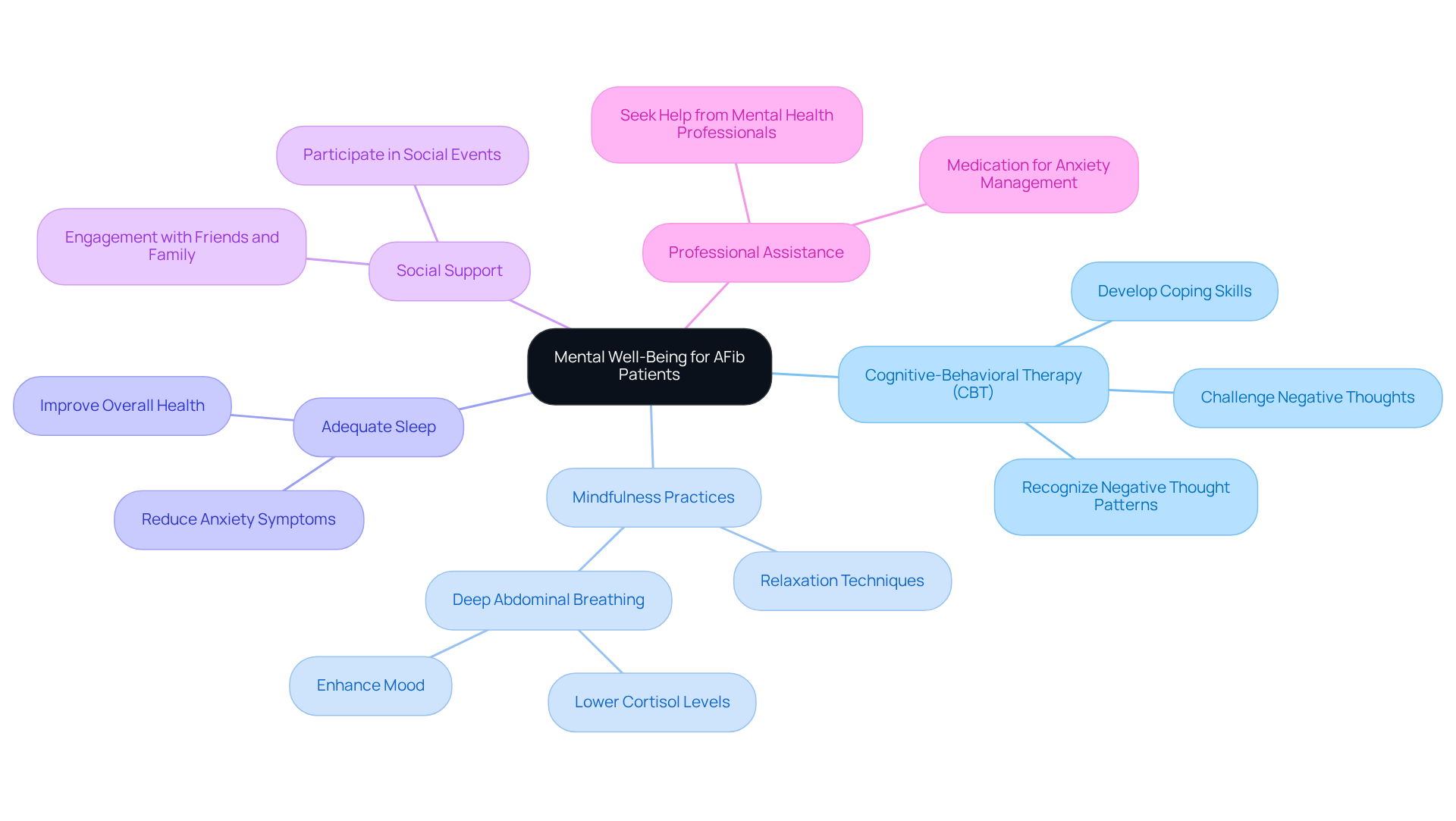
Staying informed about the latest advancements in atrial fibrillation (AFib) research and treatment options is crucial for effectively managing living with AFib. Have you considered how new medications, innovative procedures, and lifestyle changes can enhance your wellness? Engaging with reputable medical organizations, attending health seminars, and participating in clinical trials can offer valuable insights into emerging therapies that may benefit you.
Furthermore, proactive communication with your healthcare provider about recent findings and treatment options empowers you to make informed decisions regarding your care. This collaborative approach not only enhances your understanding but also fosters a supportive environment for managing AFib effectively.
Remember, living with AFib means you are not alone in this journey; there are resources and people ready to support you every step of the way.
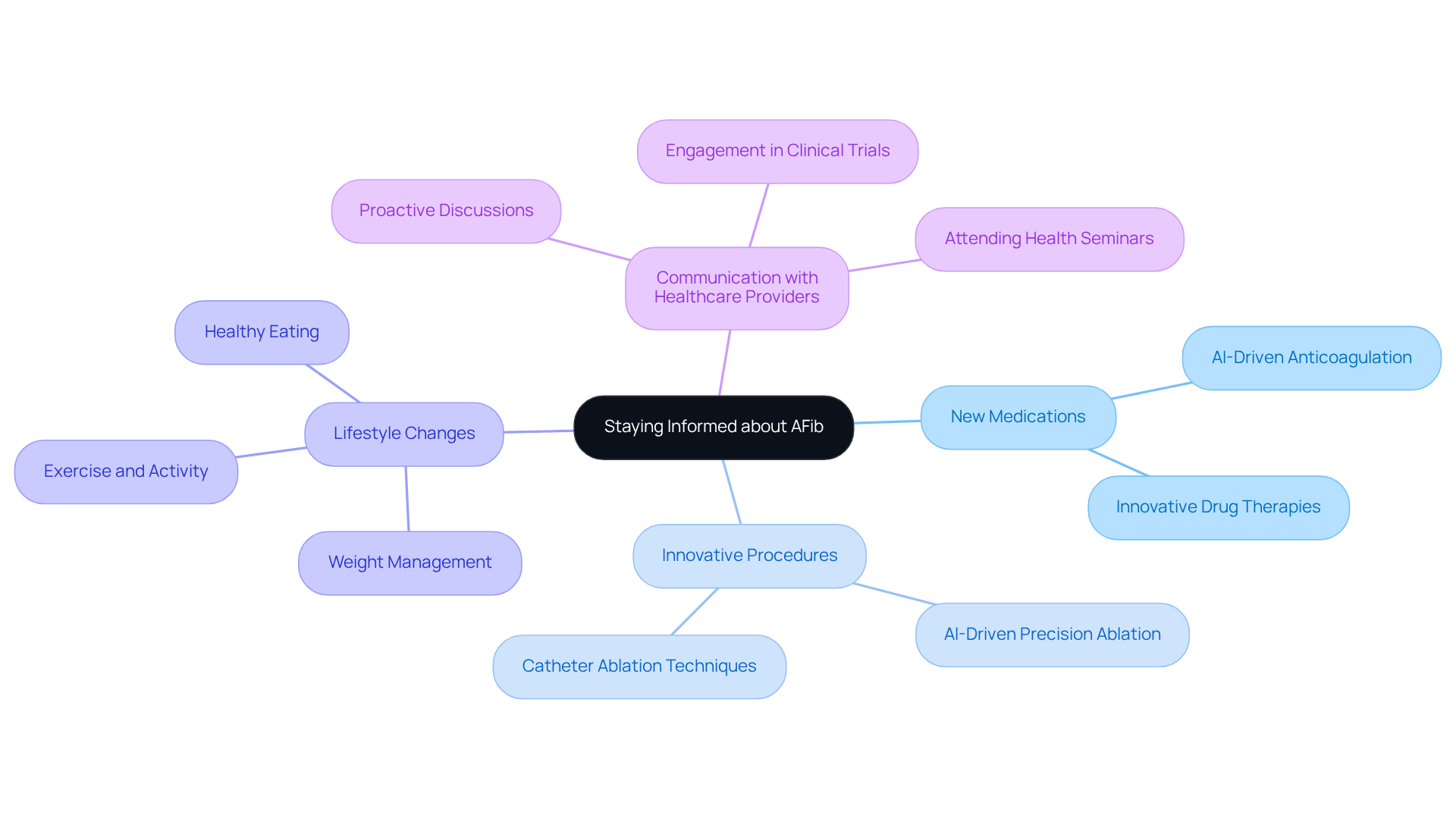
Living with atrial fibrillation (AFib) can indeed present unique challenges, but rest assured, with the right strategies, you can effectively manage your condition and improve your heart health. It's essential to embrace a holistic approach that includes:
By incorporating these vital tips into your life, you can take proactive steps toward better management of AFib and enhance your overall well-being.
Consider the importance of lifestyle modifications. Adopting a nutritious diet, engaging in consistent physical activity, and prioritizing your mental health are all crucial. Furthermore, building a support network and staying informed about the latest research and treatment options can empower you on this journey. Each of these elements plays a significant role in helping you navigate your health journey with confidence.
Ultimately, managing AFib goes beyond just adhering to a treatment plan; it involves fostering a supportive environment, prioritizing your mental well-being, and staying engaged with healthcare advancements. By implementing these strategies and seeking support, you can significantly enhance your quality of life and effectively manage your heart health. Remember, while the journey may be challenging, with the right tools and resources, a fulfilling life with AFib is entirely achievable. You are not alone in this, and support is always within reach.
What is Amavita Heart and Vascular Health's approach to managing AFib?
Amavita Heart and Vascular Health adopts a holistic and personalized care approach for AFib management, creating tailored care plans that meet the unique needs of each patient, under the leadership of Dr. Pedro Martinez-Clark.
What diagnostic tools does Amavita use for AFib management?
Amavita utilizes cutting-edge diagnostic tools, including AI-powered point-of-care ultrasound technology developed in collaboration with AISAP, which enhances early cardiac diagnostics, especially for underserved communities.
How does Amavita support patients living with AFib?
The dedicated team at Amavita offers empathetic support, empowering patients to navigate their heart condition confidently. This patient-centered approach improves the quality of care and treatment outcomes.
What dietary recommendations are suggested for individuals living with AFib?
Individuals with AFib are encouraged to embrace a heart-healthy diet rich in fruits, vegetables, whole grains, lean proteins, and omega-3 fatty acids while limiting or avoiding processed foods, high salt, caffeine, and alcohol.
What is the Mediterranean diet, and how can it help those with AFib?
The Mediterranean diet emphasizes plant-based foods, healthy fats like olive oil, and lean proteins, which can improve cardiovascular health and reduce the frequency of AFib symptoms.
How much exercise is recommended for individuals with AFib?
Patients are encouraged to engage in at least 150 minutes of moderate-intensity aerobic activity each week, such as brisk walking or cycling, while consulting their cardiologist before starting or changing any exercise routine.
What types of exercises should individuals with AFib incorporate into their routine?
In addition to aerobic activities, incorporating flexibility and strength training exercises can improve overall fitness and decrease the likelihood of falls, particularly in older adults.
What should patients with AFib do if they experience warning signs while exercising?
Patients should recognize warning signs such as chest pain or dizziness and stop exercising immediately. They should seek medical attention if these symptoms occur.
How does regular exercise benefit those living with AFib?
Consistent physical activity can significantly reduce both the frequency and severity of AFib episodes, making it a crucial component of effective heart health management.